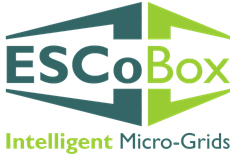ESCoBox
ESCoBox: Providing smart micro-grids for the developing world
The ESCoBox project aims to develop and test a system for remote monitoring, cashless billing and smart control of renewable energy-based micro-grids that provide productive levels of energy to promote wealth-creation in poor communities.
Two key aspects of ESCoBox make it powerful tool.
- It is a 'smart' control and monitoring system that optimises the operation of energy networks at various scales and levels of autonomy (e.g. off-grid or grid-connected) to ensure reliability of energy supply, lower cost and longer system life.
- It includes a Decision Support Tool (DST) for use by the micro-grid operator to develop effective control strategies, pricing structures and system upgrade pathways.
ESCoBox focuses on commercial models of energy service provision in order to break the cycle of aid-dependency experienced by many poor communities. As well as providing the energy to nurture entrepreneurship, ESCoBox is designed to grow with the demands of the businesses and communities it serves. The intention is to initiate – and then perpetuate – a ‘virtuous circle’, whereby ESCoBox provides energy for income-generating activities whose success increases energy demand with its growing capacity, wealth and quality of life.
People
Dr. Rupert Gammon
Senior Research Fellow
T: +44 (0)116 257 7877
E: rgammon@dmu.ac.uk
Dr. Peter Boait
Senior Research Fellow
T: +44 (0)116 257 7980
E: p.boait@dmu.ac.uk|
Varun Advani
T: +44 (0)116 250 6140
E: varun.advani@dmu.ac.uk
Contact Us
For more information on ESCoBox please contact:
Dr. Rupert Gammon
Senior Research Fellow
T: +44 (0)116 257 7877
E: rgammon@dmu.ac.uk
Varun Advani
T: +44 (0)116 250 6140
E: varun.advani@dmu.ac.uk

The benefits of ESCoBox
ESCoBox’s DST is underpinned by the agent-based modelling framework previously developed by De Montfort and Cranfield Universities in the CASCADE project. This facilitates the adaptation and optimisation of both functional control and commercial models.
Functional benefits:
- Reliability
- Efficiency
- Flexibility
- Responsiveness
- Cost-effectiveness
Commercial benefits:
- User-focussed system evolution
- Market growth and business development
- Economic risk reduction and investment support.
Download the ESCoBox Decision Support Tool (DST)
An initial release of the Decision Support Tool (DST) is available below, in two versions, hydro and PV based.
The hydro version is an Excel spreadsheet with macro that allows the peak expected demand from a population of appliances to be calculated. It is suitable for power-limited mini- or micro-grids such as micro-hydro systems.
It requires as an input the appliance type, population, power used, and expected duty cycle at each hour of the day, also the expected generator power.
An example set of data has been entered which may be edited to suit. Two data entry tables are provided, the first is for baseload appliances that are unconstrained in their use. The second allows higher power appliances to be entered whose operation is constrained to periods when spare capacity is available, for example when permitted to operate by the ESCoBox Intelligent MicroGrid Control unit. The graphs and overload colour coding indicate whether a given expected demand can be supported.
A full explanation of the concept and modelling approach can be found in our paper at:
http://www.sciencedirect.com/science/article/pii/S0973082615001040.
The PV version has the same features as the hydro version described above, but in addition simulates the power output of a set of photovoltaic panels and the operation of the associated battery system needed to provide 24-hour electricity. This allows the simulation to show whether a given set of appliances can be supported by the PV generation and battery with given weather conditions and location. The impact on battery life of the daily cycle simulated is calculated, highlighting potentially damaging levels of load.
Comprehensive instructions are included in both spreadsheets,
As for any free software, these spreadsheets are offered in the hope they are useful but no assurance or warranty of fitness for purpose in any particular application is given.
Please use this link to download the ESCoBox Hydro DST.
Please use this link to download the ESCoBox PV DST.
Partners
- De Montfort University - Lead
- Access Energy– Dr. Sam Duby, Harrison Leaf
- Newcastle University –Dr. Neal Wade
- University of Nairobi –Prof Mbuthia
- Practical Action– Drew Corbyn
Technical notes from Practical Action
As part of the EscoBox project Practical Action have produced a valuable series of technical notes on management and payment methods for mini-grids: